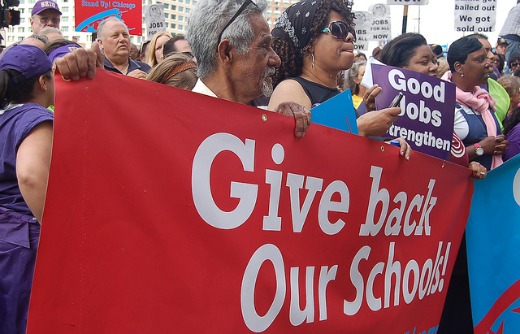
The debt deal is a bad deal for the American people and the economy.
In addition to cuts of nearly $1 trillion over 10 years in discretionary spending, a committee of 12 – six Democrats and six Republicans – will cut another $2 trillion in spending, including, in all probability, “entitlement” programs.
If they can’t reach agreement, cuts will be across the board.
At the same time, tax hikes on the rich were pulled from the agenda, leaving the haves untouched and the have-nots feeling all of the pain.
The only concessions of the right wing were to postpone a debt ceiling battle until after the 2012 elections, allow military spending to be part of the budget cutting calculus, and keep its hands off Social Security for now.
The settlement makes one ask: where is the “balance” and “shared sacrifice” here, which are problematic notions to begin with?
Debt politics won’t go into the woodwork now to reappear two years later. Without a struggle by left and progressives from in and outside the Beltway, they will dominate U.S. politics for the foreseeable future.
Almost immediately the commission of six Democrats and six Republicans will convene to begin a new round of talks, which the mass media, if they follow past practice, will feature at the top of their news.
The debt talks and deal set aside democratic procedures and principles. The American people should have been a part of any negotiations that were considering such draconian cuts in social programs, but were in effect bystanders, waiting for the worst to possibly happen.
No one in his or her right mind could consider this a highpoint in the democratic life of our country
Driving this entire process was right-wing extremism. Continuing and building on the momentum gained from the 2010 elections, it framed and steered the negotiations, as well as, recklessly employed the threat of default.
In doing so they brought the country and the world to the brink of catastrophe.
The Obama administration had a hand in the outcome for sure. It takes “two to tango;” it deserves criticism, but the lion’s share of responsibility for the deal lies with right-wing extremism. They held the country hostage. And if given a chance will do it again.
The tea party was a factor in the debt deal, but it would be a mistake to think that it alone, or it mainly, was in the driver’s seat. Other sections of the right wing, long embedded in the main reactionary groupings of transnational capital, were in command. The tea party gathers a lot of publicity, but it is still only a current within the right and the Republican Party.
The president boxed himself into a corner, not because he is a bad negotiator, but because he and his aides made the calculus on the heels of the 2010 elections that his appeal to independent voters, and thus his reelection, depend on his credentials as a “responsible fiscal manager.”
This calculation, however, could come back to bite him next year if the debt deal induces a deterioration in, or even a stabilization of, the current economic conditions.
Paul Krugman reminds us that President Roosevelt pursued this course of action in 1937 to disastrous results. Let’s hope that President Obama fares better.
Years from now economists will wonder what prompted the administration to pursue deflationary policies when the economy is contracting.
The debt negotiations and package caused divisions in both parties, but more so in the Democratic Party. The House vote was split evenly down the middle – 95 to 95. The vote clearly demonstrates that liberal and progressive congressional support can’t be taken for granted either now or next year. It has to be earned by the administration through progressive governance.
The events and outcome of these negotiations doesn’t change the strategic policy of decisively defeating the right in next year’s elections, but it will make the job more difficult. There is both unease and anger among good people – and I’m not solely talking about people on the left – with the track record of the Obama administration.
Some even go so far as to say that the two parties are essentially the same, and the negotiations over the debt limit will be new grist for their mill.
The hope engendered by the president’s election in 2008 has turned into disappointment for many people. This has to be acknowledged, but at the same time, it also has to be said that the president inherited the worse economic crisis since the Great Depression, and the Republicans have blocked this administration at nearly every turn, even when the Democrats had the majorities in both houses of Congress by use of the Senate filibuster. For the president they have made the country, for all practical purposes, ungovernable.
Moreover, it has to be said that what we are seeing now from right-wing extremism, as bad as it is, is nonetheless only a small down payment on what they would do if they regain control of every branch of government in the 2012 elections.
If this sounds like I am trying to scare the pants off you, you’re right. There is a tendency to underestimate the danger of right-wing extremism and the consequences of such an underestimation can only be negative both now and next year.
While the right danger cannot be underestimated however, it shouldn’t be equated with fascism. Fascism has a very particular meaning, and thus an authoritarian government that restricts democratic rights is not necessarily fascistic.
But are such distinctions, you might be thinking, of any importance from the standpoint of the political struggle? The answer is that they are. Access to democratic space, even if restricted, makes all the difference in the world.
Finally, the outcome of the debt talks reflects in no small measure the limited imprint of the progressive and left movements on the political process. Do we have anywhere near the power and influence of the right? The answer is obvious, but that can change, but only with a sound strategy, flexible tactics, and long persistent work at the grass roots.
Photo: Chicagoans protest bank and corporate bailouts, June 14, 2011. (PW/John Bachtell)

MOST POPULAR TODAY

High Court essentially bans demonstrations, freedom of assembly in Deep South

UN warns that Israel is still blocking humanitarian aid to Gaza

Resource wars rage in eastern Congo, but U.S. capitalism only sees investment opportunity


U.S. imperialism’s ‘ironclad’ support for Israel increases fascist danger at home






Comments